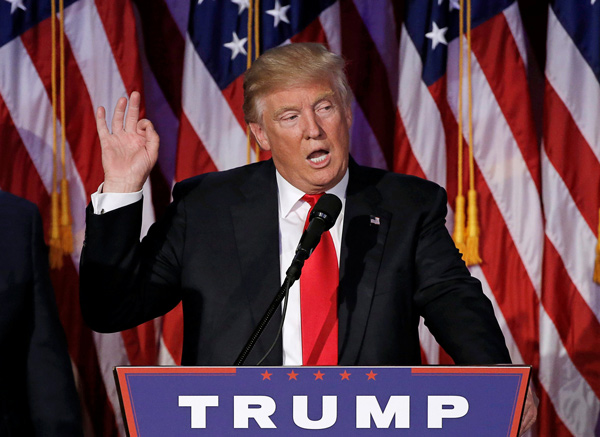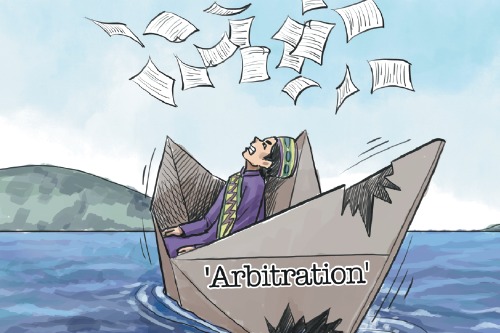Will Trump walk the talk on his vow to drain the swamp?

 |
| US President-elect Donald Trump speaks at election night rally in Manhattan, New York, US, November 9, 2016. [Photo/Agencies] |
On the campaign trail President-elect Donald Trump swore that he would drain the swamp in Washington if elected. Reflecting the American public's great distaste for Washington, his words were hailed by fervently cheering crowds.
In January, Rasmussen Reports, which specializes in the collection, publication and distribution of public opinion information, showed that 81 percent of Americans believe Washington is corrupt. A Gallup poll in September 2015 found that 75 percent of Americans saw widespread corruption in the country's government, a jump from the 66 percent in 2009.
On Nov 16, Trump announced his anti-corruption campaign by setting out tough restrictions on lobbying by incoming officials. The rules require incoming officials to terminate their lobbying registration and pledge not to lobby again until five years after they leave the administration.
Although no one seems sure how the rules will be enforced, it is a move in the right direction.
The horde of passengers getting off at Farragut North station on the Red Line of the city's metro rapid transit system every morning is quite a scene on my way to work. Outside the stop is the notorious K Street, the nickname for the lobbying industry where major lobbying companies assemble.
Having covered Washington for years, the question I often ask is why the thriving lobbying industry in Washington is even legal in a country that claims to be the world's "greatest democracy".
In Washington, countless former government officials and ex-Congressmen engage themselves in the lobbying industry, using their connections and influence to push special interest agendas and enrich themselves. With the ongoing US government transition, many who are leaving the Barack Obama administration will be sought after by major lobbying firms or may be planning to start their own lobbying companies.
If people believe that guanxi (connections) is uniquely Chinese, it is because they have not lived in Washington, where some 11,000 lobbyists, according to the Center for Responsive Politics, are trying to use exactly that with the US Congress and federal government departments.
Chinese journalists covering Washington are often surprised to find a State Department official who briefed them about the US government's Asia and China policy just weeks ago suddenly appearing as the head of a consulting company, and his business having questionable links with his previous official duties.
Such revolving door cases are indeed a normal phenomenon in Washington.
For years, the top industries that have spent the most on lobbying include pharmaceuticals, insurance, business associations, oil and gas, education, telecom services and defense aerospace.
The Wall Street Journal reported on Sunday that corporations are scrambling to retool their lobbying efforts as Republicans, preparing for control of the House of Representatives, Senate and White House in January, hope to break the partisan logjam that has blocked the passage of legislation for six years. Key issues for their hired guns will be immigration, healthcare, tax, infrastructure and Wall Street regulations.
Andrew Bacevich, a historian at Boston University, wrote on Tuesday that if Trump was serious about overturning the Washington establishment, he'd start by ending the constant wars. In Bacevich's view, wars created the swamp in the first place. Wars empower Washington. They centralize, providing a reason for federal authorities to accumulate and exercise new powers.
What he failed to elaborate is that a huge lobbying industry, especially representing the giant military industrial complex, is keeping those wars going.
With so much talk about many of Trump's nominations for the Cabinet belonging to the swamp, it will be interesting to see if Trump will walk the talk on his "drain the swamp" pledge.
The author is deputy editor of China Daily USA.
chenweihua@chinadailyusa.com


































